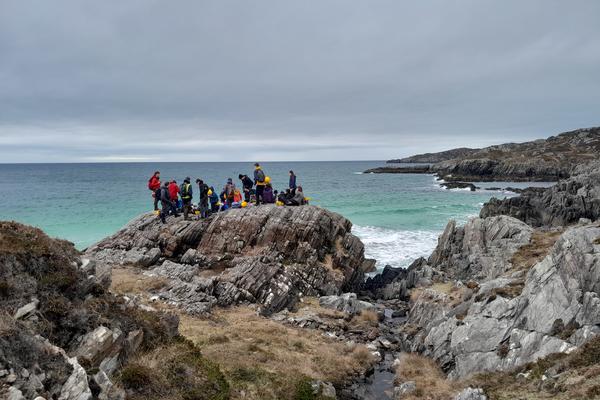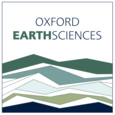Undergraduate Admissions
This page covers admissions details specific to the undergraduate Earth Sciences courses. Further information about admissions can be found on the University Undergraduate Admissions page. You can view information on the degree programmes offered in this Department on our course listing.
We offer two degrees: a three-year BA in Geology and a four-year MEarthSci in Earth Sciences. For the first three years, the two courses are identical. The fourth year allows students the option of deepening their training through a choice of higher-level specialisations and by carrying out a research project, which runs throughout the year.
BA in Geology (UCAS Code F642)
MEarthSci in Earth Sciences (UCAS Code F644)
We find that most of our students are very strongly motivated towards the fourth year of the course so we advise that, if you are in doubt about whether to apply for the three-year course or the four-year course, you should apply for the four-year course. It is a simple matter to change from the four-year course to the three-year course should you decide to do so, whereas changing from the shorter course to the longer course can sometimes be difficult.
Both courses are accredited by the Geological Society of London, allowing you to progress quickly to chartered geologist status in the future.

Application Procedure
Your application should be made on the standard UCAS form, on which you need to specify either the three-year or the four-year course. The form also allows you to state your preferred college. If you have no preference you will be allocated a college during the admission process. See our Tutors and Colleges page to find out more.
Each candidate has two interviews, each lasting around 30 minutes and conducted by two interviewers. One of the interviews is more focussed on your quantitative skills, and the other on your qualitative skills. Interviews are held online in early to mid-December. Interviews will be conducted via Microsoft Teams using Miro (a virtual whiteboard that enables both the interviewers and the candidate to write on the same document in real-time). An interview is not an examination. As part of the interview process, candidates may be asked to comment on pictures of specimens of geological nature, or to carry out mathematical derivations or calculations. This will be conducted with due recognition of previous knowledge (e.g., the specific A-Levels of each candidate) and experience in the subject being discussed.
There is no written test or submitted work.
Criteria
Academic
We refer to qualifications in terms of A-Levels, but our remarks refer equally to equivalent levels of qualification in other examination systems. Your application will be equally welcome if you are aiming towards other UK qualifications, such as Scottish Highers, or international qualifications, such as International Baccalaureate.
We require all candidates to be studying (to A-Level or equivalent):
- Mathematics
- EITHER Chemistry OR Physics
This provides the best preparation for the course, and will form part of any offer of a place.
The most highly recommended additional A-Levels for Earth Sciences are:
- Chemistry
- Physics
- Biology
- Further Mathematics
- Geology
- Geography
Additional A-Level qualifications in any of these subjects are very helpful.
Find out more about the official qualifications we require from the University Admission page or about International qualifications on the University website.
Personal Qualities
Students are selected on the basis of ability and potential in the following areas:
- Reasoning ability; aptitude for analysing and solving problems using logical and critical approaches
- Mathematical ability and potential
- Independence and creativity of thought, lateral thinking and hypothesis generation
- Capacity to absorb and use new ideas; ability to apply familiar ideas to unfamiliar situations
- Spirit of enquiry: keenness to understand the reasons for observations; depth; tendency to look for meaning; enthusiasm and curiosity in science
- Observation: accurate, critical, quantitative
- Appreciation of the field-based, laboratory and theoretical nature of the subject
Offers
Successful pre-examination candidates are made conditional offers, which are usually A*AA or AAAA at A-Level, 39 (including core points) with 766 at HL for IB, or carefully calibrated equivalents in other systems of examination. Post-qualification candidates may receive unconditional offers. The grades required by the offer will include results in Maths AND Chemistry OR Physics.
Deferred Entry
In principle, we welcome applications for deferred entry to our courses because we recognise the benefits that a gap year may bring.
Candidates can - and do - submit an application during their gap year, after completion of their A-Levels or equivalent.
However, you should be aware that (particularly in a small subject like ours) allocating places for deferred entry (so applying for admission two years before entry) makes a significant impact on the number of places available to candidates for the following year. In practice, therefore, offers for deferred entry are likely to be restricted, and some candidates for deferred entry may consequently be offered a non-deferred place instead.
Unsuccessful applicants for deferred entry are, of course, welcome to re-apply during their gap year.
Except where there are significant extenuating circumstances, it is not possible to change your application to a deferred entry once an offer has been made.
Offer Holders
We wish you luck with your exams. Once your results come out and whatever the outcome, we strongly encourage you to visit the University of Oxford’s ‘What Happens When I receive My Results?‘ website for the most comprehensive information on your next steps.
If your results meet all the conditions of your offer, your place is assured and you will be able to see confirmation of your place on UCAS Track a few days later. Congratulations! Your college will be in touch shortly after this.
Missed Offers
If you do not meet all the conditions of your offer (for example if you have not achieved the required grades) your college will make a final decision regarding your offer. If you find yourself in this situation and require further information or you feel we should be alerted to any exceptional circumstances you have experienced, please contact your college. You can also read some FAQs on meeting conditions of offers.
For more information on deferrals, appeals, autumn series exams, conditional open offers, & international qualification offer holders, please refer to the University’s results website.
Frequently Asked Questions
Before you try to write anything, reflect on what aspects of Earth sciences excite you. What sort of science news articles draw your attention? What is it about those aspects of our subject that inspire your interest? Perhaps the answer lies in an experience you had, or in a broader part of your character. If you can connect the dots of specific interests to personal experiences or qualities, this gives a clear picture of your motivation. Anyone can use the word “enthusiastic” but a compelling narrative is difficult to write if you don’t feel it deeply.
There is no ‘right’ way to write a personal statement, but honesty and a genuine motivation to study science are important. Don’t write about books you haven’t read, or activities you haven’t done, as this will quickly become apparent if you are asked in interview. We put the most weight on your motivation for wanting to study Earth sciences, rather than on lists of your achievements, extracurricular activities, or travel plans.
It can be tough to get started with writing your personal statement but if you’re struggling, try to start by writing a list of bullet points about what you’re interested in and why. Once you’ve got a draft, it’s good to get a second opinion. If you can, ask someone else to read it who can give you some feedback – maybe a teacher, or parent. There are also a lot of good resources online with advice on writing your personal statement, and you can view the Oxford guidance on the Undergraduate Admissions webpages.
We do not mind when you have taken your A-Levels but you should be prepared to discuss all relevant subjects equally at interview, irrespective of when the exams were sat.
Unlike some other science departments at the University of Oxford, there is no admissions test for Earth Sciences. Once we have received all of the applications to the undergraduate course, these will be reviewed. We aim to interview approximately 60-70% of applicants, based on: A level subjects being sat; achieved and predicted grades; a demonstrated interest in, and understanding of, Earth Sciences through the personal statement; and the teacher reference. We use the interviews as one part of the assessment process, and we also take account applicants’ track record, predicted grades, and other relevant circumstances as well when we make offers.
You will receive two interviews, which will last around 30 minutes each. Each interview will be conducted by two members of academic staff. In one of the interviews you will be asked more quantitative questions, and in the other you will be asked more qualitative questions. We know these can seem very daunting but the interviews are not designed to try and catch you out or to assess what you know. The aim is to try and get to know you as a scientist. The interviewers are interested to see how you approach scientific problems and whether you have the flexibility to work through them.
Generally, the interview questions involve applying your A-Level knowledge to new scenarios in Earth sciences. These are often big picture questions or tasks, such as interpreting a rock’s history based on your understanding of physics and chemistry or estimating the rise in sea level change from the melting of Antarctic ice using algebra. You might be asked to estimate how long a raindrop stays in the atmosphere for, and then go on to further discuss how water is circulated around the planet and the timescales and spatial scales involved. On the face of it, these might seem like impossible questions, but you’ll be given data or information to help you work through this. It’s best if you vocalise your thought processes (much like showing your working in a maths problem); the interviewers will gently guide you towards the right answer!
If you want further information, you can watch a mock interview with two of our tutors via YouTube.
There is no need to revise specifically but interview questions will be based loosely around your A-Level courses, so a good familiarity with what you have already covered will be helpful. Make sure you know what you have written in your personal statement and that you have a good understanding of the course that you are applying to and why you want to do it.
No. We don’t assume any knowledge of geology in your interviews - our questions will be based on your A-Level courses but are designed to see how you think through problems rather than testing your knowledge.
No. We do not expect you to know the A-Level courses for all the sciences, but interviewers will assume you are familiar with the subjects that you are currently studying, or studied, at A-Level.
Yes. The aim of the interviews is to see how you approach a problem, not whether you know the answer straight away. These are conversations, not tests. If you are unsure about something being discussed, or if you have questions about the course or any topic of Earth sciences, you can ask your interviewers – it’s a two-way process. If you are struggling to answer a question, the interviewers help you along with gentle guidance or by providing additional information to steer your thought processes. They also understand that interviews can be daunting and that you may be nervous, so don’t worry!
There are typically around 40 places offered on the Earth Sciences course each year and there are usually around three to four applications for every place available.




